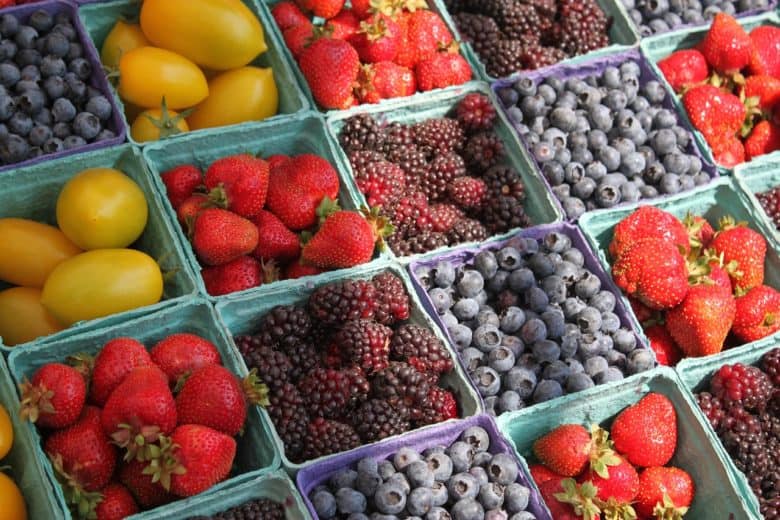
Local Food Sales on the Rise With More People Going Green
We are reader-supported. When you buy through links on our site, we may earn affiliate commission.
In light of the global warming crisis, genetically modified produce and inhumanely sourced meats, more consumers are choosing to buy local. The green revolution is in full swing, and people want to know where their food comes from. They want to know with confidence they are making the best, most sustainable choice. When consumers decide to buy locally sourced produce, they’re doing just that. Farmers’ markets, farm-to-table restaurants and you-pick produce all benefit the community, environment and consumers in several ways. Here are some of the benefits of shopping local food sales.
Reduces Your Carbon Footprint
Today’s global food system is highly complex. If you purchase items from a grocery store, odds are it’s shipped over oceans and hauled across thousands of miles of land before it ever appears on the shelf. The external environmental costs related to this mass process of production, storage, transportation and distribution are rarely ever made aware to shoppers. These expenses come in the form of fossil fuels and greenhouse gas emissions, which take a major toll on the environment.
However, local and regional food production and distribution require less transportation and, thus, less fuel. When you choose to eat at a farm-to-table restaurant or frequent your local farmers market, you lower your food miles substantially. By cutting down on these miles, you reduce your carbon footprint. Supporting your local farm also allows them to stay in operation. This means they won’t be sold to developers or big producers who could completely transform the land into a major grocery store or industrial farming operation.
Delivers Fresher Produce
Local produce is also fresher and typically tastes better because it is usually sold within two days of being picked. It also has longer to ripen on the vine, whereas mass-produced food is generally picked earlier so it doesn’t rot while traveling long distances. Still, many large retailers struggle with keeping their produce from going bad before it’s bought, resulting in a significant amount of food waste. On a smaller scale, much of this waste is cut down or recycled as compost and organic fertilizer. Many local farmers also pride themselves on keeping their crops organic, non-genetically modified, and free of hormones and pesticides. This benefits you, the consumer, by keeping harmful toxins out of your diet and ensuring you and your family remain healthy. It also keeps chemicals out of the air and surrounding waterways.
Supports the Local Economy
As previously mentioned, local food sales help family-owned businesses stay in operation. This keeps your dollars local and grows your community’s economy. In fact, twice the money you spend locally remains in the region, which means your voting dollars have double the power compared to when you purchase produce from the supermarket. Buying local also enhances the velocity, or circulation speed, of money in the area. As money moves more quickly, it passes through the hands of more people, allowing them to benefit from it and fully enjoy what it purchases for them. This also means major chain supermarkets aren’t making a huge profit, so more goes into input costs like advertising, printing, upkeep and paying employees. All this continues to inject money back into the community.
Allows for More Sustainable Farming
Within the last century, major corporations have begun to employ industrialized agriculture techniques to produce food for the planet’s growing population. However, this continuous farming has left the land stripped, damaging the soil and making it more difficult to raise the same crops in the same areas year after year. So, while industrial agriculture may have presented a solution to our food dilemma years ago, now studies suggest using regenerative techniques to plant crops.
Regenerative agriculture is a technique often used by small farmers to minimize their impact on the land. With minimal tilling and crop rotation, farmers can preserve natural soil aggregation and fertility, ensuring sustainable growth and food production. When you buy local, you fund regenerative techniques by supporting the farmers who employ them.
Buying Local Means Buying Confidently
Local food sales benefit the community, the environment and yourself in many ways. By voting with your shopping dollars, you support a healthier you, a stronger local economy, a cleaner environment and a brighter future for farming. Perhaps the most meaningful and fulfilling part of buying local is knowing exactly where your food comes from. When you go to a farmers market or purchase produce from a roadside stand, you gain a new sense of community. You connect with the neighbor who grew your corn and the farmer who raised the pig to make your bacon. As you exchange a warm handshake or a smile, you can be confident in knowing you’ve shopped sustainably, helping the planet and all its inhabitants.
Share on
Like what you read? Join other Environment.co readers!
Get the latest updates on our planet by subscribing to the Environment.co newsletter!
About the author

Jane Marsh
Starting from an early age, Jane Marsh loved all animals and became a budding environmentalist. Now, Jane works as the Editor-in-Chief of Environment.co where she covers topics related to climate policy, renewable energy, the food industry, and more.





